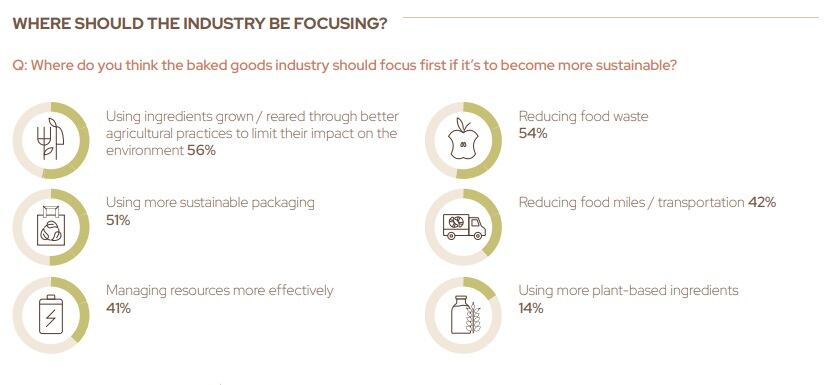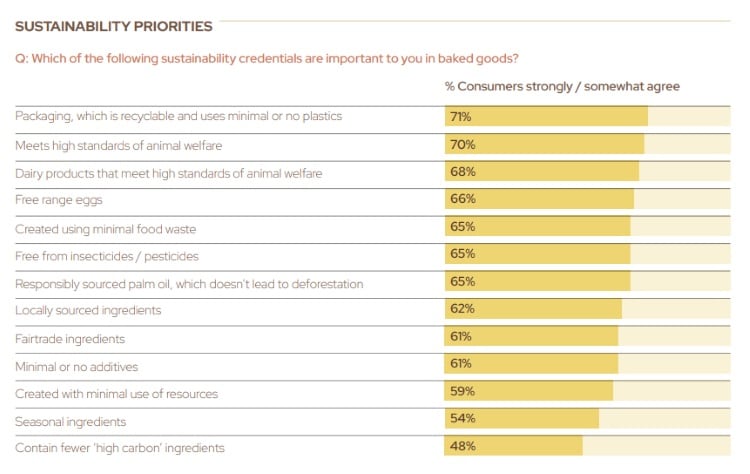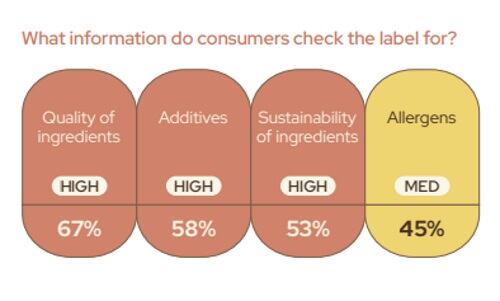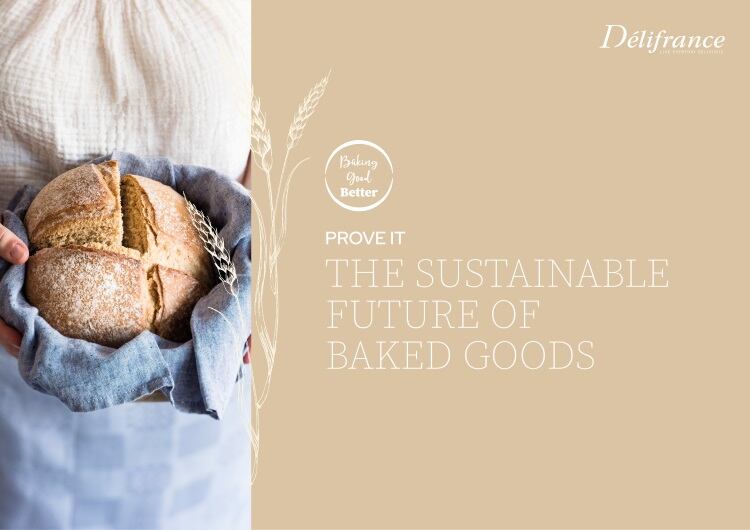Prove It: The sustainable future of baked goods tapped the attitudes and opinions of 2,000 consumers across the UK in January 2023, to find out what sustainability means to them; their credential priorities and how this affects their buying decisions; and the opportunities open to bakers, food operators and retailers to appeal to this group of consumers.
Most significantly, the research found the majority of Brits are already locked into sustainability, with a third claiming to be aware of the carbon footprint of their bakery purchase.
From nice to must have
“Over the past few years, the food industry has faced a raft of new challenges – from supply issues through to skyrocketing energy prices. This has made it harder than ever to implement activities that bake in sustainability across the supply chain, from procurement to food waste,” said Stéphanie Brillouet, Délifrance marketing director.
“It appears the sector is on the right track, and that sustainability is becoming less of a ‘nice to have’ and more of an ‘essential’ for food operators and retailers.
“Fortunately, many respondents also showed a strong understanding of shared responsibility and indicated they’ll pay a premium, showing a willingness to support proactive operators. This is great news as we work together as an industry towards our common goal of carbon neutrality.”
While sustainability credentials are a growing priority, currently they impact the purchasing decisions of only a small pool of UK consumers (15%). However, this is predicted to change significantly, with 71% of the Délifrance survey respondents saying they’d like to know more.
Younger consumers are more footprint-savvy, and this affects their choice of baked goods and operator. They are also the most frequent purchasers of bakery.

“Carbon footprint awareness is particularly high for 18-44-year-olds (1 in 4 know what it is) and impacts their buying decision. We know this group of consumers are not just driving the good-to-go market as revealed in our ‘Breakfast’ report – they also enjoy freshly baked and pre-packed bread more often, indicating particularly high demand from these consumers,” added Brillouet.
“As big buyers of baked goods, it seems these consumers are already scrutinising how sustainable products are. This should be taken into account when communicating with these consumers.”
Baking better
This is one reason why Délifrance renewed its sustainability commitments last year. 'Baking Good Better' is the company’s ambitious CSR approach, coordinating vision, commitments and action plans.
Added Nathalie Genebes, CSR director for Délifrance, “Economic changes have created a new set of challenges for our industry. The Ukraine war is impacting energy prices, inflation and growth, resulting in soaring prices, supply disruptions and increasing uncertainty.
“It’s important to consider how we move forward positively amidst this and ensure sustainability remains at the heart of everything we do to protect our people and planet.
“To show our passion to be a company with a positive impact, we recently defined our CSR strategy, Baking Good Better, to clarify our purpose and set a framework on which to achieve our ambitions. We’ve shared details in this report, in the hope that it will inspire you in your sustainability journey over the coming years.”
Top 3 sustainability credentials
The UK consumer’s top considerations in purchasing a guilt-free treat are packaging, animal welfare and food waste, indicating where bakers, food operators and ISB retailers ought to prioritise activity and communication.

More than a third believe the sustainability responsibility rests on everyone’s shoulders, however, 38% say the bakery sector should be the key player in the supply chain to drive this forward.
The plant-based movement is still a priority among 76% of the 18-24 year-old consumer group, especially driven for its minimal impact on the environment.

56% think bakers should use ingredients that are either grown (such as wheat) or reared (cage-free eggs) through better agricultural practices to limit their impact on the environment.
This is a priority, too, for Délifrance.
“We select our raw materials with the greatest care,” said Genebe.

Délifrance's Chocolate & Hazelnut Croissant - created with chocolate made from Rainforest Alliance-certified cocoa - is one of the company's UK bestsellers.
“We’ve used cage-free eggs since 2020. We don’t use hydrogenated fats and only use RSPO-certified palm oil. We have engaged with our butter suppliers to better understand their ambitions on animal welfare and improving carbon footprint.
“As part of France’s largest grain cooperative, VIVESCIA, we’re working on achieving 100% sustainable flour by 2027. We’ve also been increasing the sustainability of ingredients like cocoa, which is currently 25% Rainforest Alliance, but will be 100% certified by 2026, and we’re working with our cocoa suppliers on low carbon cocoa sourcing.”
Sustainability credentials impacts the consumer’s choice of operator, with 77% frequently choosing one outlet over another if they believe its baked goods are more sustainable. This is particularly true among 54% of 18-24 year-olds, 43% of 25-34 year-olds, and unsurprisingly, 55% of those who live in London.
Taking their commitment further, 1 in 4 indicate a willingness to pay a premium for a treat that comes with a sustainable backstory. Breaking it down, that’s 50% of 18-24 year-olds; 41% of 25-34 year-olds; and 38% of 35-44 year-olds.
80% of those willing to pay more will also choose one operator over another due to their sustainability credential. However, still a major factor in this decision is price, followed by location.
“Almost a quarter (22%) of respondents said they’d choose one operator and be willing to pay more – great news for bakeries introducing sustainability measures, which can be costly in the short term,” said Brillouet.
“It also shows the value in communicating what you’re doing – on packaging, online, and at POS.”
Golden opportunity
With 75% reportedly checking the label, this shows why packaging info is so important. 64% claim to scrutinise ingredients lists for unrecognisable words and known bakery no-no’s.

Sustainability, however, cuts across many different areas, which can be difficult to convey on packaging. Fortunately, there’s interest in QR codes and websites, allowing operators to communicate more complex sustainability issues
“With 46% of consumers interested in learning more and another 25% undecided, there’s plenty of opportunity for bakeries to engage with – and potentially win – customers through amping up communications,” added Brillouet.
“The consumers who chose ingredients grown or reared through better agricultural practices were least likely to say no to paying extra for sustainable baked goods. This might indicate an understanding of the costs involved to the industry, and a willingness to share these.
“The least engaged consumers chose food waste as an industry priority – with 60% of those not interested in carbon footprint or sustainability credentials opting for this. Perhaps this could be a first step, bringing consumers onboard at the start of their sustainability journey?”
Added Genebes, “Some of our lovingly created products don’t reach the consumer, so we look at how we can redirect or re-purpose these. As well as valorisation during production, we work with customers to make sure nothing is wasted. Activity includes the ‘No Waste: All Taste’ section on our website, which has mouth-watering recipes for day-old bread and viennoiserie, and working with partners like ‘Too Good To Go’ to make sure as little as possible goes to waste.”
Following the establishment of the Food Data Transparency Partnership (FDTP), it’s likely that sustainability reporting will become standard – meaning any baker, operator or retailer would be remiss to play ostrich.
It’s a golden opportunity “to stay one step ahead of the curve, aligning consumer needs with responsible business, without affecting profits,” said Brillouet.
“We hope that as an industry, we can all help one another to reduce our carbon footprint and achieve our common goal of contributing to carbon neutrality.”
Since its creation in France in 1978, Délifrance has been developing bread, viennoiserie, pâtisserie and savoury products for foodservice operators, bakers and retailers in over 100 countries. Harking on its heritage, artisan techniques and exacting standards, the company is dedicated to help its customers attract and delight their own consumers at each moment of the day.


